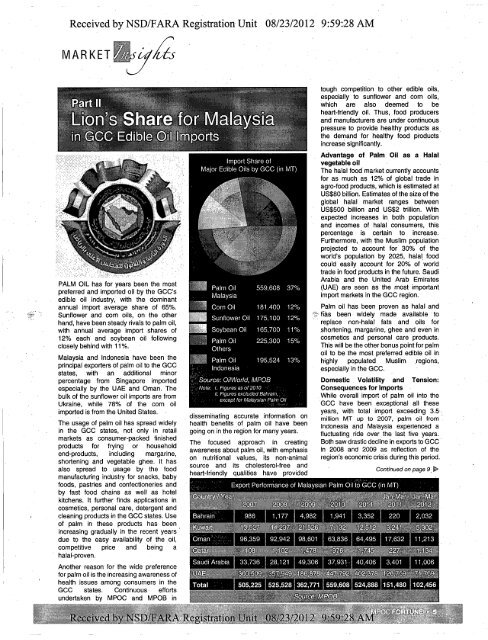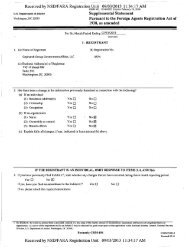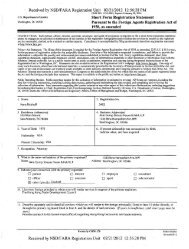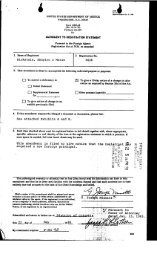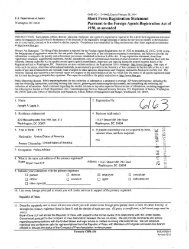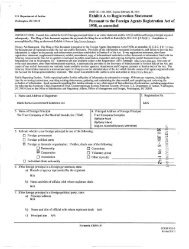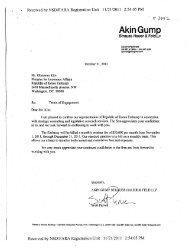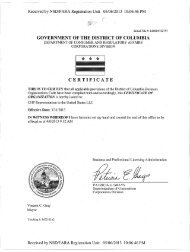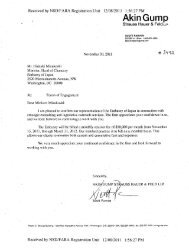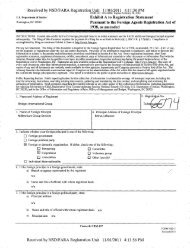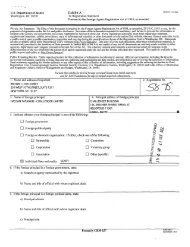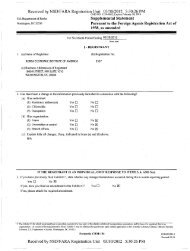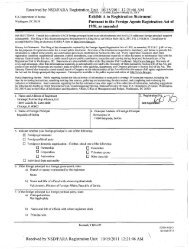Supplemental Statement - FARA
Supplemental Statement - FARA
Supplemental Statement - FARA
You also want an ePaper? Increase the reach of your titles
YUMPU automatically turns print PDFs into web optimized ePapers that Google loves.
Received by NSD/<strong>FARA</strong> Registration Unit 08/23/2012 9:59:28 AM<br />
MkRKEl^s^Ms<br />
1: iv^w^s ('^VC-T^- forte? \iJi&}'\p\vo2A2 i '<br />
iallfsl<br />
PALM OIL has for years been the most<br />
preferred and imported oil by the GCC's<br />
edible oil industry, with the dominant<br />
annual import average share of 65%.<br />
Sunflower and corn oils, on the other<br />
hand, have been steady rivals to palm oil,<br />
with annual average import shares of<br />
12% each and soybean oil following<br />
closely behind with 11%.<br />
Malaysia and Indonesia have been the<br />
principal exporters of palm oil to the GCC<br />
states, with an additional minor<br />
percentage from Singapore imported<br />
especially by the UAE and Oman. The<br />
bulk of the sunflower oil imports are from<br />
Ukraine, while 78% of the corn oil<br />
imported is from the United States.<br />
The usage of palm oil has spread widely<br />
in the GCC states, not only in retail<br />
markets as consumer-packed finished<br />
products for frying or household<br />
end-products, including margarine,<br />
shortening and vegetable ghee. It has<br />
also spread to usage by the food<br />
manufacturing industry for snacks, baby<br />
foods, pastries and confectioneries and<br />
by fast food chains as well as hotel<br />
kitchens. It further finds applications in<br />
cosmetics, personal care, detergent and<br />
cleaning products in the GCC states. Use<br />
of palm in these products has been<br />
increasing gradually in the recent years<br />
due to the easy availability of the oil,<br />
competitive price and being a<br />
halal-proven.<br />
Another reason for the wide preference<br />
for palm oil is the increasing awareness of<br />
health issues among consumers in the<br />
GCC states. Continuous efforts<br />
undertaken by MPOC and MPOB in<br />
Corn Oil 181.400<br />
I Palm Oil 225,300<br />
Others<br />
Palm Oil 195,524<br />
Indonesia<br />
disseminating accurate information on<br />
health benefits of palm oil have been<br />
going on in the region for many years.<br />
The focused approach in creating<br />
awareness about palm oil, with emphasis<br />
on nutritional values, its non-animal<br />
source and its cholesterol-free and<br />
heart-friendly qualities have provided<br />
Bahrain<br />
tough competition to other edible oils,<br />
especially to sunflower and corn oils,<br />
which are also deemed to be<br />
heart-friendly oil. Thus, food producers<br />
and manufacturers are under continuous<br />
pressure to provide healthy products as<br />
the demand for healthy food products<br />
increase significantly.<br />
Advantage of Palm Oil as a Halal<br />
vegetable oil<br />
The halal food market currently accounts<br />
for as much as 12% of global trade in<br />
agro-food products, which is estimated at<br />
US$80 billion. Estimates of the size of the<br />
global halal market ranges between<br />
US$500 billion and US$2 trillion. With<br />
expected increases in both population<br />
and incomes of halal consumers, this<br />
percentage is certain to increase.<br />
Furthermore, with the Muslim population<br />
projected to account for 30% of the<br />
world's population by 2025, halal food<br />
could easily account for 20% of world<br />
trade in food products in the future. Saudi<br />
Arabia and the United Arab Emirates<br />
(UAE) are seen as the most important<br />
import markets in the GCC region.<br />
Palm oil has been proven as halal and<br />
has been widely made available to<br />
replace non-halal fats and oils for<br />
shortening, margarine, ghee and even in<br />
cosmetics and personal care products.<br />
This will be the other bonus point for palm<br />
oil to be the most preferred edible oil in<br />
highly populated Muslim .regions,<br />
especially in the GCC.<br />
Domestic Volatility and Tension:<br />
Consequences for Imports<br />
While overall import of palm oil into the<br />
GCC have been exceptional all these<br />
years, with total import exceeding 3.5<br />
million MT up to 2007, palm oil from<br />
Indonesia and Malaysia experienced a<br />
fluctuating ride over the last five years.<br />
Both saw drastic decline in exports to GCC<br />
in 2008 and 2009 as reflection of the<br />
region's economic crisis during this period.<br />
Export Performance of Malaysian Palm Oil to GCC (in MT)<br />
Continued on page 9 p-<br />
986 1,177 4,982 1,941 3,352 220 2,032<br />
: bman ? ;777:;. 96,359 92,942 98,601 63,836. 64,495 17,632 11,213<br />
Saudi'Arabia 33,736 .28,121 49,306 37,931- 40,406 3,401 11,006<br />
505,225 525,528 362,771 559,608 524,888 151,480 102,456<br />
Rcccixcd h\ \SI) I- \R \ Registration I : nit OS.23 2012 ( >:5 l >:2* AM


